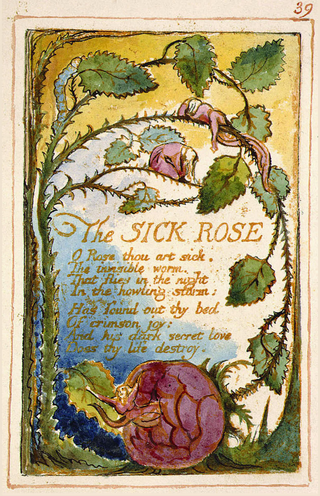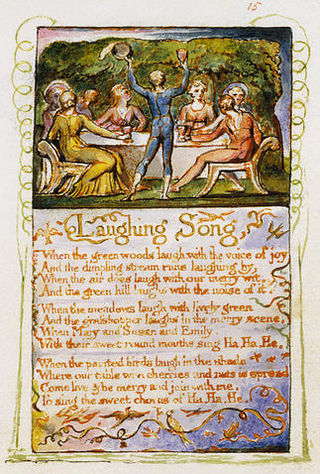
"The Lamb" is a poem by William Blake, published in Songs of Innocence in 1789.

"The Chimney Sweeper" is the title of a poem by William Blake, published in two parts in Songs of Innocence in 1789 and Songs of Experience in 1794. The poem "The Chimney Sweeper" is set against the dark background of child labour that was prominent in England in the late 18th and 19th centuries. At the age of four and five, boys were sold to clean chimneys, due to their small size. These children were oppressed and had a diminutive existence that was socially accepted at the time. Children in this field of work were often unfed and poorly clothed. In most cases, these children died from either falling through the chimneys or from lung damage and other horrible diseases from breathing in the soot. In the earlier poem, a young chimney sweeper recounts a dream by one of his fellows, in which an angel rescues the boys from coffins and takes them to a sunny meadow; in the later poem, an apparently adult speaker encounters a child chimney sweeper abandoned in the snow while his parents are at church or possibly even suffered death where church is referring to being with God.

Songs of Innocence and of Experience is a collection of illustrated poems by William Blake. It appeared in two phases: a few first copies were printed and illuminated by Blake himself in 1789; five years later, he bound these poems with a set of new poems in a volume titled Songs of Innocence and of Experience Shewing the Two Contrary States of the Human Soul. Blake was also a painter before the creation of Songs of Innocence and Experience and had painted such subjects as Oberon, Titania, and Puck dancing with fairies.

"The Little Black Boy" is a poem by William Blake included in Songs of Innocence in 1789. It was published during a time when slavery was still legal and the campaign for the abolition of slavery was still young.

"The Blossom" is a poem by William Blake, published in Songs of Innocence in 1789.

"The Sick Rose" is a poem by William Blake, originally published in Songs of Innocence and of Experience as the 39th plate; the incipit of the poem is O Rose thou art sick. Blake composed the poem sometime after 1789, and presented it with an illuminated border and illustration, typical of his self-publications. Since the 20th century, the poem has been the subject of scrutiny by scholars for its oblique and enigmatic meaning, and bizarre, suggestive imagery.

Holy Thursday is a poem by William Blake, from his 1789 book of poems Songs of Innocence.

"Holy Thursday" is a poem by William Blake, first published in Songs of Innocence and Experience in 1794. This poem, unlike its companion poem in "Songs of Innocence" (1789), focuses more on society as a whole than on the ceremony held in London.

"The Angel" is a poem written by the English poet William Blake. It was published as part of his collection Songs of Experience in 1794.

"Infant Joy" is a poem written by the English poet William Blake. It was first published as part of his collection Songs of Innocence in 1789 and is the counterpart to "Infant Sorrow", which was published at a later date in Songs of Experience in 1794.

"The Shepherd" is a poem from William Blake's Songs of Innocence (1789). This collection of songs was published individually four times before it was combined with the Songs of Experience for 12 editions which created the joint collection Songs of Innocence and of Experience (1794). Blake produced all of the illuminated printings himself beginning in 1789. Each publication of the songs has the plates in a different order, and sixteen other plates were published posthumously.

"The Divine Image" is a poem by the English poet William Blake from his book Songs of Innocence (1789), not to be confused with "A Divine Image" from Songs of Experience (1794). It was later included in his joint collection Songs of Innocence and of Experience (1794). In this poem Blake pictures his view of an ideal world in which the four traditionally Christian virtues–Mercy, Pity, Peace and Love–are found in the human's heart and stand for God's support and comfort. Joy and gratitude are sentiments expressed through prayer for the caring and blessing of an infallible almighty God and are shared by all men on Earth encompassing a sense of equality and mutual respect. The title of the poem refers to the Book of Genesis Chapter 1 verse 26: 'And God said: Let us make man in our image'.(KJV)

The Ancient of Days is a design by William Blake, originally published as the frontispiece to the 1794 work Europe a Prophecy. It draws its name from one of God's titles in the Book of Daniel and shows Urizen crouching in a circular design with a cloud-like background. His outstretched hand holds a compass over the darker void below. Related imagery appears in Blake's Newton, completed the next year. As noted in Alexander Gilchrist's 1863 book, Life of William Blake, the design of The Ancient of Days was "a singular favourite with Blake and as one it was always a happiness to him to copy". As such there are many versions of the work extant, including one completed for Frederick Tatham only weeks before Blake's death.

Introduction to the Songs of Experience is a poem written by the English poet William Blake. It was etched and published as part of his collection Songs of Innocence and of Experience in 1794.

The Voice of the Ancient Bard is a poem written by the English poet William Blake. It was published as part of his collection Songs of Innocence in 1789, but later moved to Songs of Experience, the second part of the larger collection Songs of Innocence and of Experience, 1794.
"Night" is a poem in the illuminated 1789 collection Songs of Innocence by William Blake, later incorporated into the larger compilation Songs of Innocence and of Experience. "Night" speaks about the coming of evil when darkness arrives, as angels protect and keep the sheep from the impending dangers.

Spring is a lyric poem written and illustrated by William Blake. It was first published in Songs of Innocence (1789) and later in Songs of Innocence and Experience (1794).

"The Little Boy Found" is a poem by William Blake first published in the collection Songs of Innocence in 1789. Songs of Innocence was printed using illuminated printing, a style Blake created. By integrating the images with the poems the reader was better able to understand the meaning behind each of Blake's poems.

"The Little Boy Lost" is a simple lyric poem written by William Blake. This poem is part of a larger work titled Songs of Innocence which was published in the year 1789. "The Little Boy Lost" is a prelude to "The Little Boy Found".

"Laughing Song" is a poem published in 1789 by the English poet William Blake. This poem is one of nineteen in Blake's collection Songs of Innocence.



























